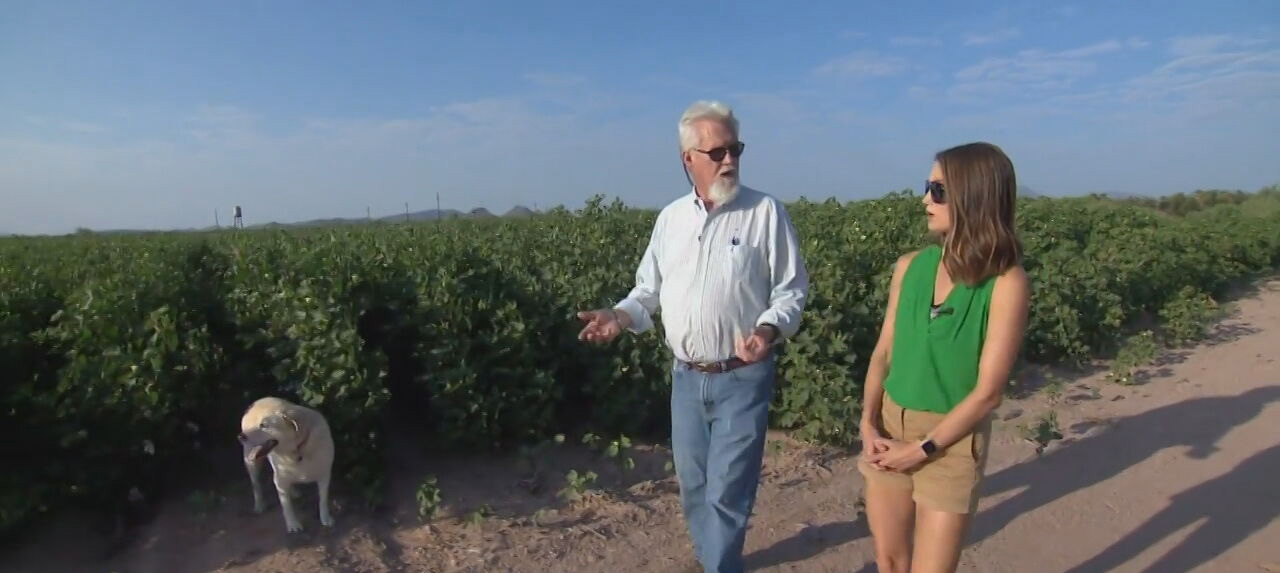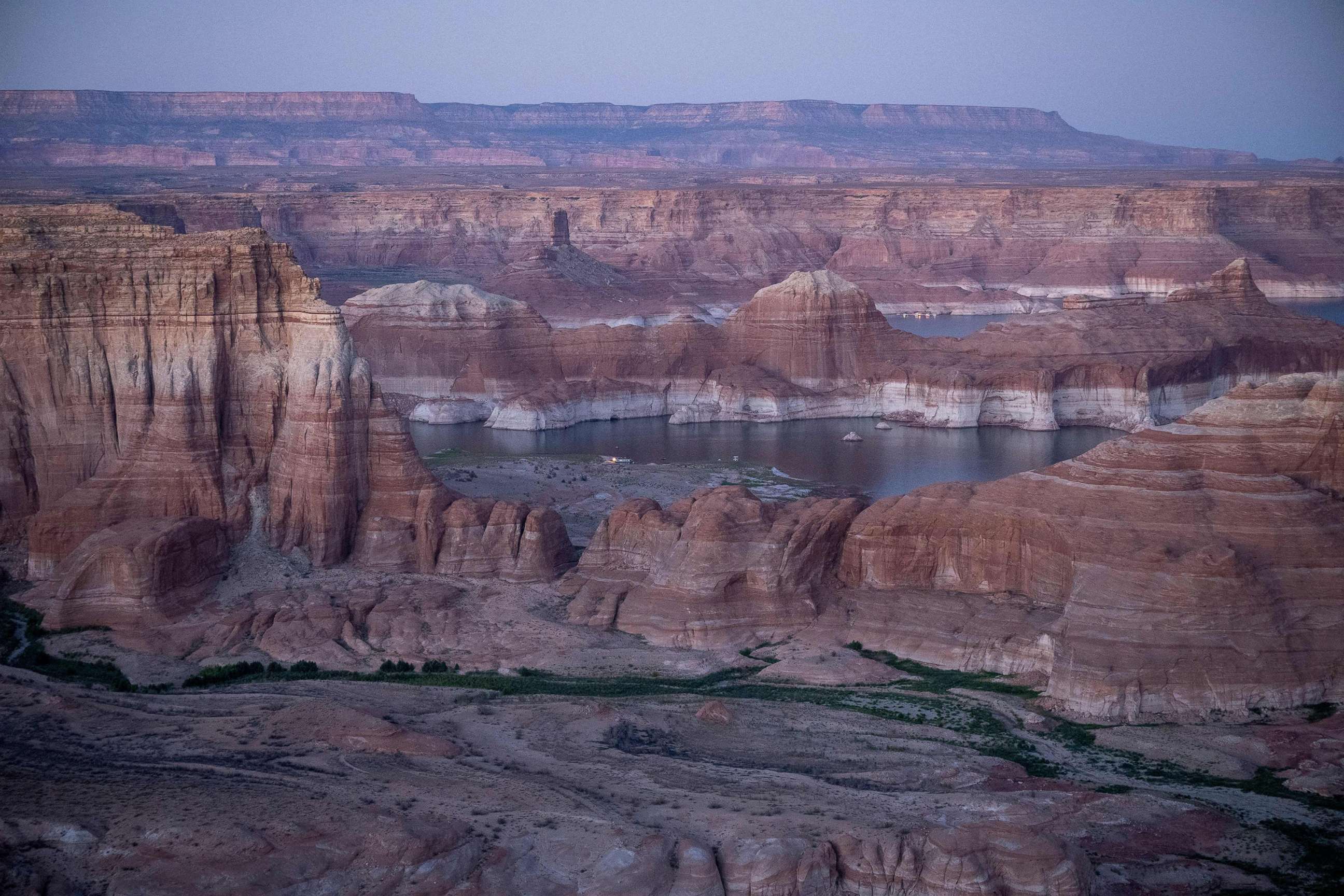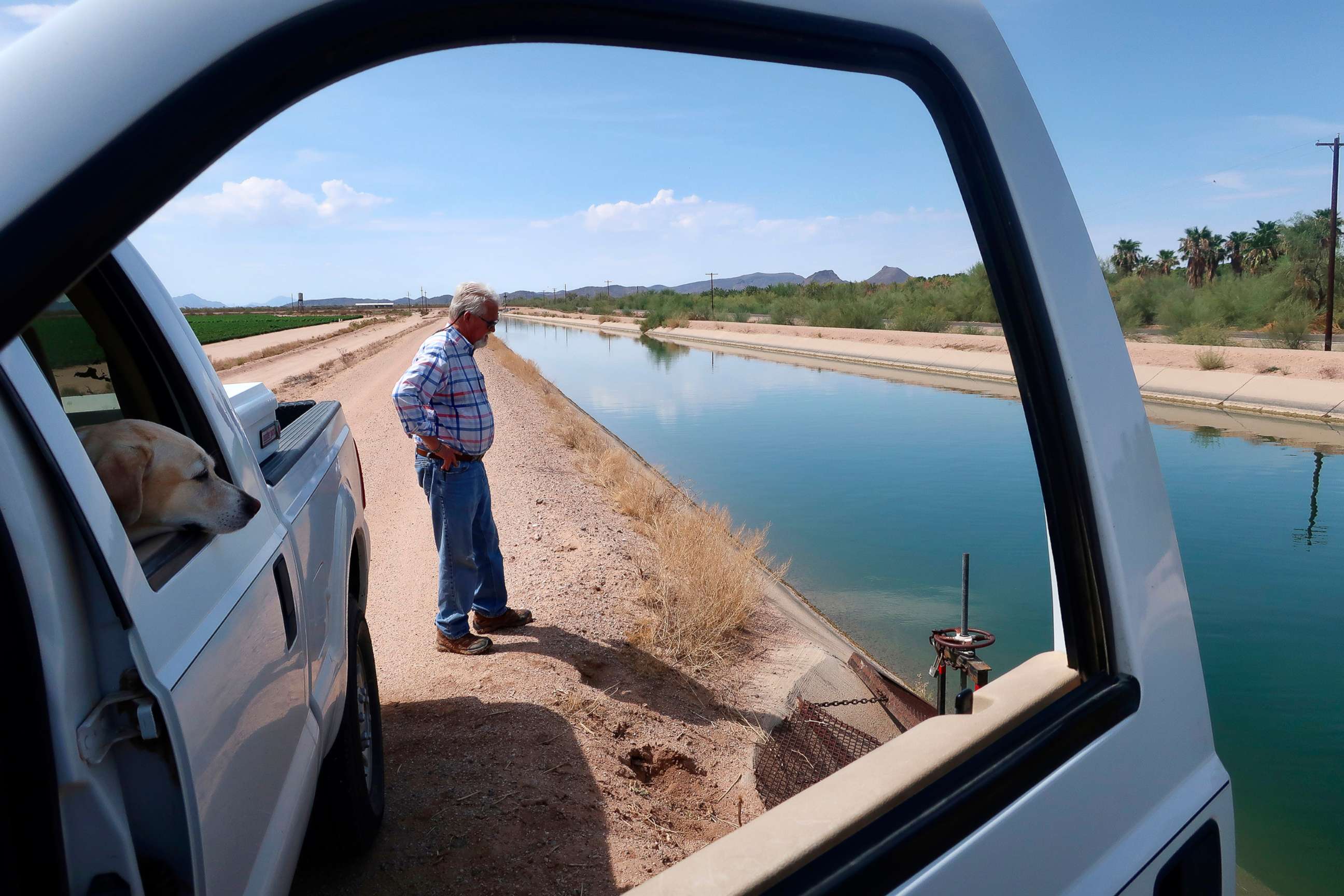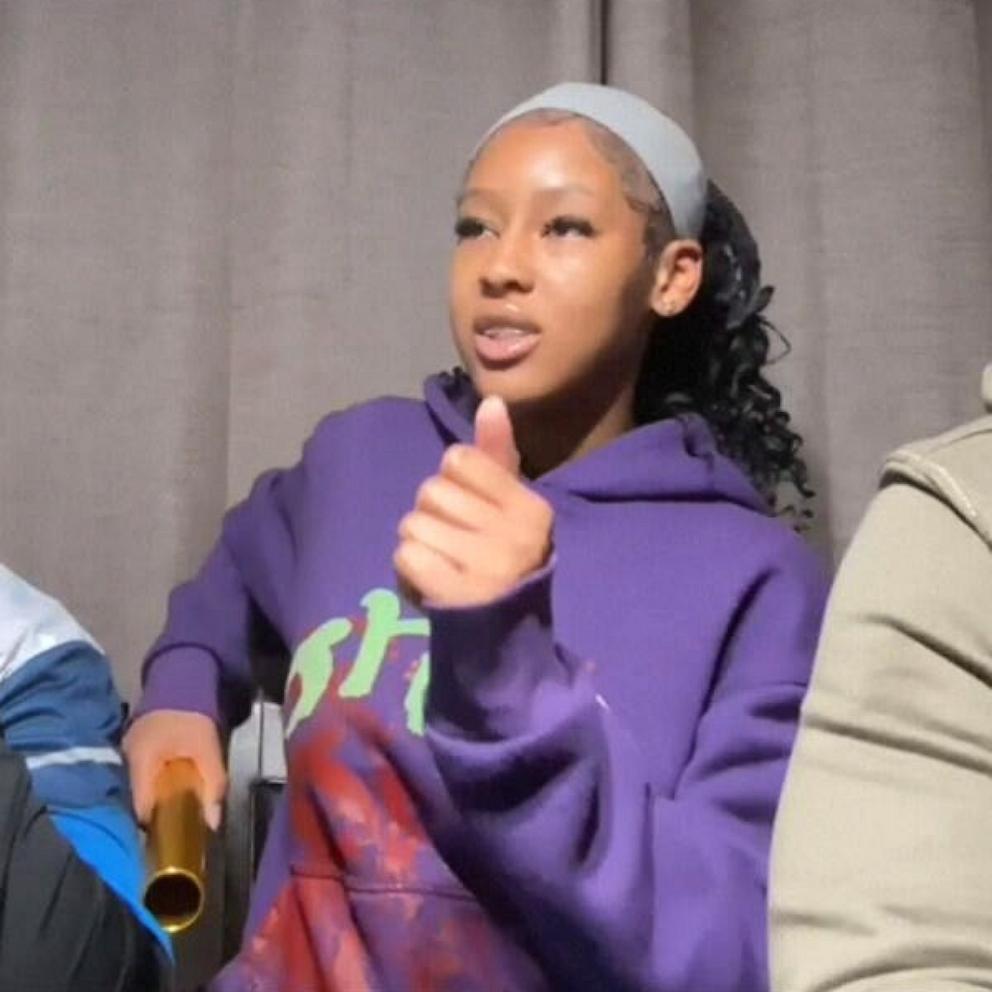Colorado River drought cuts through key Western midterm races
PHOENIX -- The scorched-earth fight over a shrinking supply of water in Western states is playing out in key midterm races along the depleted Colorado River.
Paul "Paco" Ollerton, 67, a third-generation farmer and registered Republican who says he's undecided in the November midterms, worries how his cotton farm might suffer next year when Arizona sees a massive cut in its allocation of Colorado River water.
"It's gonna get tough," Ollerton told ABC News in a phone interview, one year after ABC correspondent Kayna Whitworth walked with him through his Casa Grande farm. "There's no doubt about it, and I question whether agriculture in this state will even be able to survive."
Ollerton said he's witnessing fellow farmers in Pinal County replace their lettuce fields with rows of solar panels, adjusting their livelihoods to the fast-moving effects of climate change which, in the West, means a life with a lot less water.

After 23 years of drought conditions fueled by climate change, the centuries-old compact governing who pulls from the Colorado River, the country's largest source of fresh water serving 40 million people and supporting $1.4 trillion in annual economic activity, is no longer sufficient.
Water usage among the seven basin states surpasses what's been agreed upon, so the Bureau of Reclamation, the federal government's water manager, ordered last month that Arizona and Nevada, as well as Mexico, make drastic cuts in how much water they use: 21% less for Arizona, 8% less for Nevada and 7% less for Mexico.
Voters like Ollerton, who may have not considered climate policy as a top issue in years past, are paying close attention to the debate around the future of water as the upcoming election showcases the different approaches to the drought from Democrats and Republicans. If the 50-50 Senate flips to a Republican majority, it will be more challenging for President Joe Biden to advance his climate agenda, leaving states to find new solutions to increasingly urgent problems caused by the warming planet.
"Unfortunately, our agriculture in the state of Arizona has given up everything," Ollerton said after the state, Nevada and Mexico saw water cuts for the first time last year before other cuts last month. "You've got states out there that got their heels dug in, and they're just not gonna do anything. That's just not right … But they're not going to replenish it, and the water is gone. You can't bring it back. So it's just a huge mess."
Incumbent Democrats lean on climate wins
Federal officials want the basin states to slash their water usage by up to 30%, a reduction that translates to enough water to cover a full-length football field 2 to 4 million times over. It would be a massive cut -- only matched by the acute impact of the mega-drought on Western states, where water has been drying up for years.
For context, the average household uses one-half to one acre-foot of water per year, and Ollerton needs 1,200 acre-feet to farm 300 water duty acres, or acres requiring water, annually.

Democratic senators in vulnerable seats out West, including Arizona's Mark Kelly, are hoping to win the votes of people like Ollerton by putting the water crisis up-front in their campaigns. Kelly, Sen. Catherine Cortez Masto of Nevada and Sen. Michael Bennet of Colorado have talked up their roles in negotiating $4 billion in drought relief funding in the Inflation Reduction Act, as well as their ability to work across the aisle with the passage of the bipartisan infrastructure law last year, which also included $8 billion to tackle drought conditions.
In a handful of events across Arizona focused on drought relief measures, Kelly has set an optimistic tone for partnerships with other basin states to address the crisis. He's also repeatedly called on California, the largest water consumer of the basin states, to make additional cuts.
"As a country, in the United States, we're really good at solving tough engineering problems," Kelly said at a recent campaign event in Tempe. "We're gonna solve this one, and we're gonna get through it. We have the resources to do it. We just need to get other states like California on board."
But his Republican opponent, political newcomer Blake Masters, said he doesn't foresee California giving up any water without renegotiated, binding agreements and criticized the senator's rhetoric and actions as not strong enough.
"He talks a lot about, oh, that we need to 'all join together and make a partnership' and it's like -- no, I want someone to fight for Arizona. Bring out the sharp elbows, renegotiate that thing and let's make sure Arizona gets its fair allocation," Masters told ABC News last month in Phoenix. "We need representatives that are going to be unashamedly 'America First' and Arizona first."

Calling back to Kelly saying that Arizona's drought problem is "not existential" but workable, Masters said the senator "was trying to calm people down, and nope, my message is the opposite."
"This is an existential problem," Masters countered. "We're in the desert. We're in a drought. We're growing. Those don't add up … What good is a huge beautiful property or development -- how much is a million-dollar house worth -- if you turn on the faucet and it has no water?"
The salience of the water crisis has increased dramatically among Arizona voters this year, according to Bill Scheel, a longtime consultant to Democrats in the state.
"Even up until a year or two ago, it was pretty abstract. We all go over the bridge on the Hoover Dam on our way to Las Vegas, see that big lake, and we think that water will always be there," Scheel told ABC News. "At some point, it's going to run out."
"We can't rely on the federal government to save us, so I think it's starting to sink in with voters that we really are in a crisis mode," he said. "Our whole way of life here in Phoenix and Tucson is going to be radically different."
In Nevada and Colorado, Republican challengers Adam Laxalt and Joe O'Dea have repeatedly condemned the Inflation Reduction Act, as has Masters. Asked by ABC News about drought relief measures, Masters said "that funding, specifically, is probably good" but "probably not enough."
"Those bills were bad because they had so much crap in them," he said. "But this is the way Washington, D.C., works. It's like people vote for these pork-laden bills if they can just get one or two little things of their own added."

O'Dea told ABC News he supports the $4 billion for Western drought relief in the Inflation Reduction Act, but -- as Masters also has -- he credited Arizona Sen. Kyrsten Sinema, who is not up for re-election, with securing the funding, and criticized the legislation for not addressing inflation but adding to spending.
"I'm grateful Krysten Sinema used her seat to secure funding to address the Colorado River drought. Time and again we've seen Senators Sinema and [Joe] Manchin use their seats to help their states. The same cannot be said for Michael Bennet, who's only had one bill signed into law in 13 years," he said. "The so-called Inflation Reduction Act, however, is a massive tax increase on working Americans and manufacturers. I wouldn't be boasting about voting for additional spending and more IRS agents during a recession like Michael Bennet and Joe Biden did this week."
Laxalt's press secretary, Brian Freimuth, also mirroring language used by Masters and O'Dea, told ABC News, "Senator Cortez Masto should have demanded real change in exchange for her vote on any number of Democrat spending bills, but instead she's scrambling with a last-minute, election year effort to cover her tracks."
Last month, Cortez Masto touted her record: "I've led efforts in Congress to get Nevada the resources it needs to combat drought, and we're leading the way in water conservation. But this administration urgently needs to take a stronger role in ensuring that all states along the Colorado River take the actions that Nevada already has, so that all states along the Colorado River Basin are contributing their fair share to addressing this crisis."
While Laxalt and O'Dea's campaign websites do not address the water crisis or the environment at large, Masters' lists his opposition to the so-called "Green New Deal," a progressive raft of climate proposals, and a vow to "fight the federal bureaucrats who for decades have siphoned away our water and sabotaged our rural economy, citing bogus environmentalist concerns."
'Finger-pointing' among parched-states
Julie Hill-Gabriel, vice president for water conservation at the National Audubon Society, said in an interview with ABC News that candidates and voters in the West alike are raising the issue with the attention of the midterms but that having one state make more immediate cuts doesn't get to the root of the problem.
"Having everyone point fingers at each other is not going to get us to a long-term, sustainable solution," she said. "We have to address the underlying reality that there's simply not enough water to continue business as usual and start managing for a hotter, dryer system."
California Natural Resources Secretary Wade Crowfoot, responding to the messaging in Arizona's Senate race, said his state is working to identify and make cuts "regardless of what others do."

"We haven't been uncomfortable characterizing those conversations between water agencies because we think it's important they have the space to actually discuss," Crowfoot told ABC News.
"From our perspective, we're really focused on working with Arizona on a common solution, avoiding conflict or finger-pointing, and identifying cuts that we all need to make beginning this year," he added. "But a fair point is that today, we have not come to an agreement with Arizona or Nevada."
Scheel, the strategist, thinks the key to solving the water crisis will be found in negotiation and pitched the incumbent Democratic candidates as offering better continuity in that task, as opposed to the incoming Republicans, particularly those backed by Donald Trump
"It's a really stark difference if you're talking about getting in the room, either within the state to divvy up a smaller share of water or negotiating with California and Nevada and the upper basin states -- who is actually going to be able to rely on experts, talk to the interested parties, and then make sure they're acting on behalf of all of Arizona?" Scheel said. "And there's no indication whatsoever that either Blake Masters or [gubernatorial nominee] Kari Lake is in a position to do that."
Arizona governor's candidate proposes new pipeline
The Western water crisis is also reverberating in statewide races, particularly in Arizona, which will see the most cuts next year to its Colorado River usage: 21%.
Republican gubernatorial candidate Lake, who, like Masters, denies the validity of the 2020 election without providing evidence, told ABC News she wants to look at better water storage like covering up canals to help prevent evaporation and push back on federal government regulations, calling out the "Bureau of Land Mismanagement."
Lake supports pipelining water in from the Mississippi or Missouri River basin, an idea that environmental activists condemn and legal experts say would take decades in court. When asked about the proposal, she told ABC News, "No idea is too pie in the sky to at least consider."
Ollerton, the Arizona farmer, also said, "It's not as crazy of an idea as it sounds," citing support for the Army Corps of Engineers to investigate the feasibility of moving that water further West.

The engineering might be feasible, Hill-Gabriel said, but the plan to pipeline water under at least four states is wrought with fiscal, legal, and political issues and could exacerbate climate conditions that are causing the drought in the first place.
Arizona Secretary of State Katie Hobbs, the Democratic nominee for governor, called Lake's plan "another example of how she's not serious about governing."
"She's just saying what she thinks she needs to say to get elected," Hobbs told ABC News. "She has no real plans to tackle this or other serious challenges that we're facing."
Hobbs unveiled a plan in June proposing forming a group directly tasked with securing water for Arizona, upgrading water infrastructure, and investing in a "clean energy economy" to address long-term climate change challenges.
"We're focused on not just water but the compounding impacts that climate change has on our water shortage, as well as threatening our natural resources, increased wildfires and things like that," she told ABC News. "But really, first and foremost, it's about partnership," echoing Senate Democrats' messaging but adding a slight at GOP leadership in Arizona, which has elected a Republican governor in three straight elections.
"The fact that our leaders have continued to kick the water issue down the road, and not take the decisive action that's needed is why we're in this crisis now," Hobbs added.
But Ollerton said with all the policy talk, he's still unclear what help is coming and when. The temperature is only getting warmer, the water is not coming back and crops on farms like his are already suffering.
"It never hurts when find Lake Mead has dropped a level and another body is uncovered because it just kind of brings it to everyone's attention," Ollerton said. "But I still don't think that sometimes that people get the grasp of how bad it is."
ABC News' Stephanie Ebbs contributed to this report.




